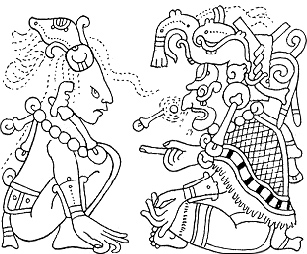Year 605 (DCV) was a common year starting on Friday of the Julian calendar. The denomination 605 for this year has been used since the early medieval period, when the Anno Domini calendar era became the prevalent method in Europe for naming years.

Maya mythology is part of Mesoamerican mythology and comprises all of the Maya tales in which personified forces of nature, deities, and the heroes interacting with these play the main roles. The myths of the Pre-Hispanic era have to be reconstructed from iconography. Other parts of Maya oral tradition are not considered here.

Maya, literally "illusion" or "magic", has multiple meanings in Indian philosophies depending on the context. In ancient Vedic literature, Māyā literally implies extraordinary power and wisdom. In later Vedic texts and modern literature dedicated to Indian traditions, Māyā connotes a "magic show, an illusion where things appear to be present but are not what they seem". Māyā is also a spiritual concept connoting "that which exists, but is constantly changing and thus is spiritually unreal", and the "power or the principle that conceals the true character of spiritual reality".

Mayapan, , is a Pre-Columbian Maya site a couple of kilometers south of the town of Telchaquillo in Municipality of Tecoh, approximately 40 km south-east of Mérida and 100 km west of Chichen Itza; in the state of Yucatán, Mexico. Mayapan was the political and cultural capital of the Maya in the Yucatán Peninsula during the Late Post-Classic period from the 1220s until the 1440s. Estimates of the total city population are 15,000–17,000 persons, and the site has more than 4,000 structures within the city walls, and additional dwellings outside.

Maya Angelou was an American poet, singer, memoirist, and civil rights activist. She published seven autobiographies, three books of essays, several books of poetry, and is credited with a list of plays, movies, and television shows spanning over 50 years. She received dozens of awards and more than 50 honorary degrees. Angelou is best known for her series of seven autobiographies, which focus on her childhood and early adult experiences. The first, I Know Why the Caged Bird Sings (1969), tells of her life up to the age of 17 and brought her international recognition and acclaim.

The Maya peoples are a large group of Indigenous peoples of Mesoamerica. They inhabit southern Mexico, Guatemala, Belize, El Salvador and Honduras. The overarching term "Maya" is a collective designation to include the peoples of the region that share some degree of cultural and linguistic heritage; however, the term embraces many distinct populations, societies, and ethnic groups that each have their own particular traditions, cultures, and historical identity.

Maya Khabira Rudolph is an American actress, voice actress, comedian and singer. Rudolph first gained prominence in the mid-1990s as a member of the alternative rock band The Rentals before joining The Groundlings improv troupe later in the decade. In 2000, Rudolph became a cast member on the NBC television series Saturday Night Live and subsequently appeared in supporting roles in films such as 50 First Dates (2004) and A Prairie Home Companion (2006).

Just Shoot Me! is an American television sitcom that aired on NBC from March 4, 1997, to August 16, 2003, with a total of 148 half-hour episodes spanning seven seasons. The show was created by Steven Levitan, the show's executive producer. The show follows the staff at the fictional fashion magazine Blush.

Maya & Miguel is an American children's television educational animated series produced by Scholastic Studios with animation by Starburst Animation Studios and Yeson Animation Studios. It formerly aired on PBS as part of the PBS Kids and PBS Kids Go! lineups. The show ran from October 11, 2004 to October 10, 2007, and had a total of five seasons and 65 episodes. Centering on the lives of preteen Hispanic twins named Maya and Miguel Santos and their friends, the program is aimed at promoting multiculturalism and education in general. It is geared to the 5-9 age range. Part of the dialogue in each episode in the English version is in Spanish but only individual words or phrases which are explained in English.

I Know Why the Caged Bird Sings is a 1969 autobiography describing the early years of American writer and poet Maya Angelou. The first in a seven-volume series, it is a coming-of-age story that illustrates how strength of character and a love of literature can help overcome racism and trauma. The book begins when three-year-old Maya and her older brother are sent to Stamps, Arkansas, to live with their grandmother and ends when Maya becomes a mother at the age of 16. In the course of Caged Bird, Maya transforms from a victim of racism with an inferiority complex into a self-possessed, dignified young woman capable of responding to prejudice.

Maya script, also known as Maya glyphs, was the writing system of the Maya civilization of Mesoamerica and is the only Mesoamerican writing system that has been substantially deciphered. The earliest inscriptions found which are identifiably Maya date to the 3rd century BCE in San Bartolo, Guatemala. Maya writing was in continuous use throughout Mesoamerica until the Spanish conquest of the Maya in the 16th and 17th centuries.

Queen Māyā of Sakya was the birth mother of Gautama Buddha, the sage on whose teachings Buddhism was founded. She was sister of Mahāpajāpatī Gotamī, the first Buddhist nun ordained by the Buddha.

Apocalypto is a 2006 American epic adventure film co-produced, co-written and directed by Mel Gibson. The film features a cast of Native American and Indigenous Mexican actors consisting of Rudy Youngblood, Raoul Trujillo, Mayra Sérbulo, Dalia Hernández, Ian Uriel, Gerardo Taracena, Rodolfo Palacios, Bernardo Ruiz Juarez, Ammel Rodrigo Mendoza, Ricardo Diaz Mendoza and Israel Contreras. Similar to Gibson's earlier film The Passion of the Christ, all dialogue is in a modern approximation of the ancient language of the setting. Here, the Indigenous Yucatec Maya language is spoken, with subtitles, which sometimes refer to the language as Mayan. This was the last film Gibson directed until 2016's Hacksaw Ridge ten years later.

Kukulkan is the name of a Mesoamerican serpent deity. Prior to the Spanish Conquest of the Yucatán, Kukulkan was worshipped by the Yucatec Maya peoples of the Yucatán Peninsula, in what is now Mexico. The depiction of the Feathered Serpent is present in other cultures of Mesoamerica. Kukulkan is closely related to the deity Q'uq'umatz of the K'iche' people and to Quetzalcoatl of Aztec mythology. Little is known of the mythology of this Pre-Columbian era deity.

Tat’yana Avenirovna Proskuriakova was a Russian-American Mayanist scholar and archaeologist who contributed significantly to the deciphering of Maya hieroglyphs, the writing system of the pre-Columbian Maya civilization of Mesoamerica.

Chichen Itza was a large pre-Columbian city built by the Maya people of the Terminal Classic period. The archaeological site is located in Tinúm Municipality, Yucatán State, Mexico.

The 2012 phenomenon was a range of eschatological beliefs that cataclysmic or otherwise transformative events would occur on or around 21 December 2012. This date was regarded as the end-date of a 5,126-year-long cycle in the Mesoamerican Long Count calendar, and as such, festivities to commemorate the date took place on 21 December 2012 in the countries that were part of the Maya civilization, with main events at Chichén Itzá in Mexico, and Tikal in Guatemala.
Eduard Marian Ilie, better known by his stage name Edward Maya, is a Romanian DJ and musician.
















